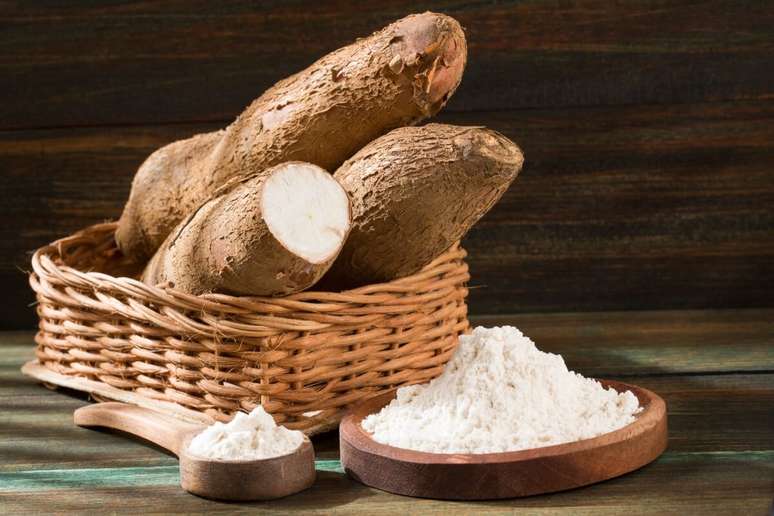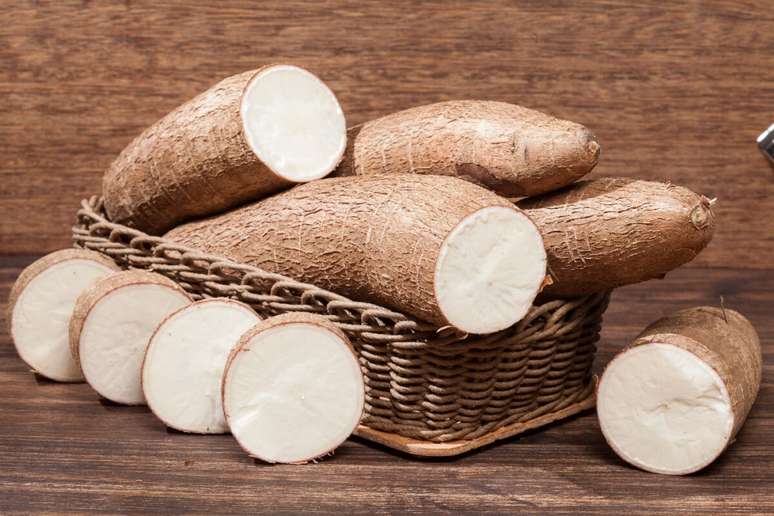Find out how this tuber promotes health and helps prevent disease
Cassava is a root native to South America, cultivated for thousands of years by indigenous populations, who used it as one of their main food sources. Also known as cassava or cassava, it is a highly appreciated ingredient in Brazil, present in various typical recipes, both sweet and savory.
In addition to being versatile in the kitchen, cassava offers health benefits, as it is rich in complex carbohydrates that provide energy, contains fiber that aids digestion, and also contains important vitamins and minerals, such as calcium, iron and potassium.
Next, see 10 Reasons to Add Cassava to Your Diet!
1. Source of potassium
Cassava stands out for its high potassium content, surpassing many other tubers. Essential for electrolyte balance and blood pressure regulation, this nutrient is also essential for the proper functioning of muscles and nerves. Adopting a diet rich in this mineral can reduce the risk of shots and strengthen both muscles and bones, among other benefits.
In fact, according to the study “The importance of potassium in the diet for the regulation of blood pressure”, published in the Brazilian Development Journal, increasing the intake of potassium through the consumption of fruit and vegetables, which are foods with higher concentrations of this mineral, contributes to the prevention and treatment of systemic arterial hypertension.
2. Excellent source of folic acid
Especially during pregnancy, folic acid, also present in cassava, is essential for the correct development of the fetus, as well as being essential for the formation of DNA and healthy cells. Furthermore, regular consumption is recommended to avoid nutritional deficiencies, especially in vulnerable groups.
3. Benefits of anthocyanins
Found in the purple variety of cassava, anthocyanins are pigments with powerful antioxidant effects. These not only reduce the risk of heart disease and improve cognitive function, but also act as anti-inflammatories, directly benefiting visual health.
4. Low sodium
The low level of sodium makes cassava an ideal option for those following salt-restricted diets, significantly helping to reduce the risks associated with hypertension and other heart diseases. According to the Ministry of Health (MS) Vigitel 2023 survey, hypertension is one of the most common health conditions in Brazil, affecting approximately one in four adults.
5. Versatility in preparation
Whether boiled, roasted or made into flour, cassava retains its nutrients in different preparation methods. This versatility allows you to explore a wide range of textures and flavors, enriching any balanced diet.

6. Alternative for intolerants
Differentiating itself from many cereals and legumescassava is a safe choice for those who have certain dietary restrictions, such as gluten, nut, soy and lactose intolerance. This aspect allows many to enjoy their favorite dishes without worries.
7. Stimulate the metabolism
In addition to its nutritional content, it is rich in B vitamins, especially thiamine, which is essential for converting carbohydrates into energy. This helps not only in energy metabolism, but also in supporting muscle and nerve function.
8. Source of Vitamin C
Cassava is a source of vitamin Ca fundamental nutrient to strengthen the body’s defenses and help protect against infections and colds. Furthermore, the vitamin contributes to the healing and proper functioning of the body, keeping it more resistant and healthy. Its regular consumption can support immunity naturally, making the body better prepared to deal with diseases. In general, for adults, the recommended daily intake of the nutrient is 75 mg for women and 90 mg for men.
9. Source of calcium
According to the Brazilian Table of Food Composition (TBCA), from the University of São Paulo (USP) and the Food Research Center (FoRC), 100 g of cooked cassava provides approximately 18.5 mg of calcium. This is an essential nutrient for maintaining bone and tooth health. It works by strengthening bones, preventing diseases such as osteoporosis and contributing to cell regeneration. Furthermore, calcium also plays an important role in muscle contraction and the proper functioning of the nervous system.
10. Prevents constipation
This tuber is also rich in fiber – such as pectin and beta-glucans – and resistant starch which help the intestines function properly, promote the growth of bacteria and prevent constipation. According to the World Health Organization (WHO), the recommended daily consumption for adults is at least 25 g of fiber.
While fiber increases the stool volumeresistant starch nourishes the beneficial bacteria of the gut microbiota, maintaining digestive health and nutrient absorption.
Source: Terra
Ben Stock is a lifestyle journalist and author at Gossipify. He writes about topics such as health, wellness, travel, food and home decor. He provides practical advice and inspiration to improve well-being, keeps readers up to date with latest lifestyle news and trends, known for his engaging writing style, in-depth analysis and unique perspectives.









